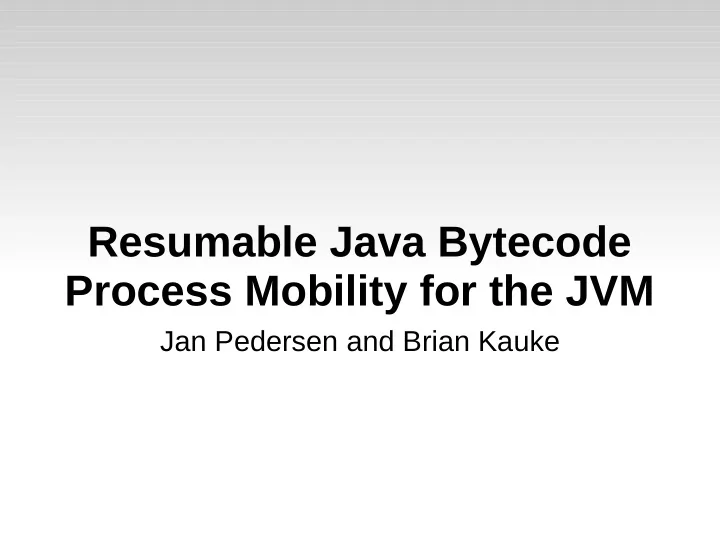

Resumable Java Bytecode Process Mobility for the JVM Jan Pedersen and Brian Kauke
Overview The ProcessJ language Transparent process mobility Implementing mobility in the Java/JCSP translation
Intro to ProcessJ ProcessJ is a new process-oriented language Syntax close to Java and a semantics close to occam-π Scoping rules similar to Java Provides an approachable environment for broader audience of imperative programmers Multiple target platforms
Intro to ProcessJ Multiplexer Example (Occam) PROC mux (CHAN INT in1?, in2?, out!) INT data: WHILE TRUE ALT in1 ? data out ! data in2 ? data out ! data :
Intro to ProcessJ Multiplexer Example proc void mux(chan<int>.read in1, chan<int>.read in2, chan<int>.write out) { int data; while (true) { alt { data = in1.read() : out.write(data); data = in2.read() : out.write(data); } } }
Intro to ProcessJ Sequential subset mimics Java/C • Semicolon delimited statements • Assignment, arithmetic • Conditionals (if, switch statements) • For, While loops
Intro to ProcessJ Channels look like JCSP channels Special syntax for: • Par blocks par { ... } • Alt blocks alt { ... } • Case protocols ProtocolType m; switch(m = c.read()) { case tag1 : ... case tag2 : ... ... }
Our Compiler Multiple backends - C (MPI), Java (JCSP), Occam-π - Java backend targets Java source code - Take advantage of javac's optimizer
JCSP / JCSP.net Offers most of the tools needed - Serialization - Network Classloading - Mobile Channels, Processes
Process Mobility JCSP supports mobile processes MobileProcess p = in.read(); p.plugin(c1, c2); p.run(); out.write(p); Correct implementation of MobileProcess is left to the programmer.
Transparent Mobility Certain behavior implied at suspend point mobile proc void foo() implements MobileProc{ int a = 0; while (a == 0) { a = a + 1; suspend; a = a - 1; } }
Challenges JVM does not cleanly support transparent mobility - No continuations - Limited control flow constructs (no gotos) - Nested scopes (determining content of activation record is not simple)
Suspending Support must be added for saving and restoring the local variable part of the JVM activation record We support parameter change, so parameters do not need to be saved Control must be returned to caller
Resuming Restore activation record with saved locals Jump to appropriate control point (instruction following the previous suspend) Goto would be nice here!
General Rewriting Methods Source code rewriting - Must separate code into regions between suspend calls - Java compiler sensitive to visibility of declared variables - Large overhead in generated lines of code
General Rewriting Methods Bytecode rewriting - We lose a lot of information looking at bytecode only - Requires control flow analysis on bytecode to save and restore variables correctly
Generated Source Code public class Foo { public void foo() { while(1) { ... suspend(); ... } } }
Generated Source Code public class Foo { private Object[] actRec; public void foo() { while(1) { ... // Store locals to actRec suspend(); resume(); ... // Restore from actRec } } public static void suspend() {} public static void resume() {} }
Generated Source Code public class Foo { private Object[] actRec; private int jumpTarget = 0; public void foo() { switch (jumpTarget) { case 1: break; default: break; } while(1) { ... // Store locals to actRec jumpTarget = 1; suspend(); resume(); ... // Restore from actRec } jumpTarget = 0; } ... }
Generated Source Code public class Foo { private Object[] actRec; private int jumpTarget = 0; public void foo() { switch (jumpTarget) { case 1: goto #1; default: break; } while(1) { ... // Store locals to actRec jumpTarget = 1; suspend(); resume(); #1 ... // Restore from actRec } jumpTarget = 0; } ... }
Bytecode Transformation ... 4: lookupswitch { 1: 24; default: 27; } 24: goto 27 27: ... ... 57: invokestatic suspend()v 60: invokestatic resume()V // #1 ...
Bytecode Transformation ... 4: lookupswitch { 1: 60; default: 27; } 24: goto 27 27: ... ... 57: invokestatic suspend()v 60: nop ...
Bytecode Transformation ... 4: lookupswitch { 1: 60; default: 27; } 24: goto 27 27: ... ... 57: return 60: nop ...
Example proc void sender(chan<MobileType>.write c) { Foo foo = new mobile Foo; foo(); c.write(foo); } proc void receiver(chan<MobileType>.read c) { Foo foo = c.read(); foo(); } proc void main() { chan<MobileType> c; par { sender(c.write); receiver(c.read); } }
Result ProcessJ includes a simple method for defining mobile processes in the style of occam-π We have described a method for translating this into Java with JCSP using minimal bytecode manipulation
Recommend
More recommend